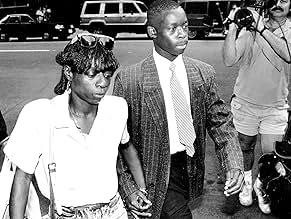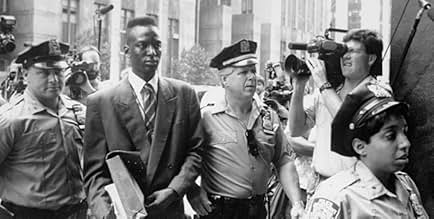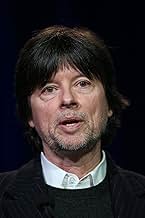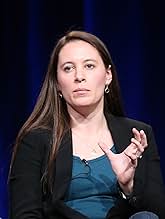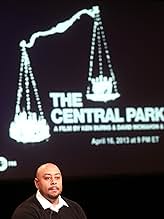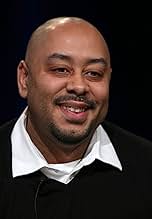IMDb RATING
7.7/10
8.2K
YOUR RATING
A documentary that examines the 1989 case of five black and Latino teenagers who were convicted of raping a white woman in Central Park. After having spent between 6 and 13 years each in pri... Read allA documentary that examines the 1989 case of five black and Latino teenagers who were convicted of raping a white woman in Central Park. After having spent between 6 and 13 years each in prison, a serial rapist confessed to the crime.A documentary that examines the 1989 case of five black and Latino teenagers who were convicted of raping a white woman in Central Park. After having spent between 6 and 13 years each in prison, a serial rapist confessed to the crime.
- Directors
- Writers
- Stars
- Awards
- 10 wins & 18 nominations total
Kharey Wise
- Self - Wrongfully Convicted
- (as Korey Wise)
Matias Reyes
- Self - Confessed Rapist
- (archive footage)
- (archive sound)
Calvin O. Butts III
- Self - Reverend
- (as Rev. Calvin Butts)
- Directors
- Writers
- All cast & crew
- Production, box office & more at IMDbPro
Featured reviews
The Central Park Five (2012)
**** (out of 4)
Excellent documentary from Ken Burns, Sara Burns and David McMahon about the 1989 crime that shocked New York City. A white woman went jogging in Central Park where she would be severely beaten and raped. Five black teenagers were eventually charged with the crime with the only evidence being their own confessions, which were pretty much planted in them by the police. I was only vaguely familiar with this case and hadn't really heard about all the events that happened back when the crimes happened. With that said, it's pretty shocking to see these five were convicted of these crimes and it's pretty clear that the only reason they were prosecuted was the media attention and all the hatred that it stirred up among people. Yes, race was certainly a factor and it was also a factor that the crime happened in Central Park. As the film mentions, other crimes were being committed everywhere yet very little media attention happened. There's no question that the material was given to the right people as there's all sorts of great information given about the case, the trial and what would eventually clear the five people. If you're familiar with the work of Ken Burns then you know he always talks about the "other" situations around the subject. That happens here when they discuss the crime rates in NYC and how this played a part in the police needing to solve this crime even if they went after the wrong people. Another great aspect is that all five people are interviewed and hearing from them is certainly priceless. Sadly, those who cost them years of their lives were too big of cowards to appear on camera and what's even more shocking is that they still seem to think they did nothing wrong.
**** (out of 4)
Excellent documentary from Ken Burns, Sara Burns and David McMahon about the 1989 crime that shocked New York City. A white woman went jogging in Central Park where she would be severely beaten and raped. Five black teenagers were eventually charged with the crime with the only evidence being their own confessions, which were pretty much planted in them by the police. I was only vaguely familiar with this case and hadn't really heard about all the events that happened back when the crimes happened. With that said, it's pretty shocking to see these five were convicted of these crimes and it's pretty clear that the only reason they were prosecuted was the media attention and all the hatred that it stirred up among people. Yes, race was certainly a factor and it was also a factor that the crime happened in Central Park. As the film mentions, other crimes were being committed everywhere yet very little media attention happened. There's no question that the material was given to the right people as there's all sorts of great information given about the case, the trial and what would eventually clear the five people. If you're familiar with the work of Ken Burns then you know he always talks about the "other" situations around the subject. That happens here when they discuss the crime rates in NYC and how this played a part in the police needing to solve this crime even if they went after the wrong people. Another great aspect is that all five people are interviewed and hearing from them is certainly priceless. Sadly, those who cost them years of their lives were too big of cowards to appear on camera and what's even more shocking is that they still seem to think they did nothing wrong.
I was leery of this despite a friend's recommendation. I didn't live in NY at the time and basically ignored the news reports. So, this film I found fascinating, should be required for all law students and certainly worthwhile for everyone else. It could have been 5 or 10 minutes shorter but frankly I feel that way about most films. I had a bit of confusion sorting out the Five and their adult selves. (One of them changed to or from a Muslim-sounding name, I think). Also it's a very interesting portrait of NYC circa 1990. I'd like to know more about why the civil case is still "unresolved". The tone of the film is indignant but, more importantly, it is truth-seeking. That's why it's so compelling: we viewers want to find out what happened.
I remember the skeptical tone of one news report I read in 2002, when the Central Park Five ("CP5") were exonerated due to Matias Reyes's confession to the 1989 assault and rape of Trisha Meili. The majority of people (including myself) who gave the story a cursory glance seemed doubtful about a serial rapist who was already serving a life sentence--i.e., with nothing left to lose by making a false confession--meeting one of the CP5 by chance in prison and taking the blame in order to clear the names of several young men who must have been properly convicted some years earlier. "What did Reyes get in return?" many of us wondered, ignoring the facts that all of the CP5 had already completed their sentences for the rape and near-murder of Meili--though one of them was incarcerated for a later drug trafficking offense and just happened to meet Reyes in prison--and that Reyes's DNA matched the profile found at the crime scene.
THE CENTRAL PARK FIVE is very important in showing the other side of the story. It definitely has its slant, as any documentary will, but it makes a strong argument for the basic fact that five teenaged boys were convicted solely because of coerced and contradictory confessions to the crime after hours of being interrogated and played off against one another with a complete disregard for the lack of direct evidence against them. It clearly shows how this can and does happen far more often than many of us want to think. It's also very revealing of how dangerous public emotion and outrage, regardless of its focus, can be.
Unfortunately, the NYPD, the prosecutors in the case, and everyone else responsible for the convictions declined to speak to Directors Ken and Sarah Burns, which is very telling but also limits the scope of the film. THE CENTRAL PARK FIVE is dominated by interviews with the CP5 and their relatives, obviously a crucial ingredient, but it becomes repetitive. There are, however, important comments from then-Mayor Ed Koch, who was all for conviction and serious punishment of the CP5 in 1989 but has now apparently changed his mind. The brief input by NYC historian Craig Steven Wilder and several others also adds a great deal.
One of the strongest aspects of THE CENTRAL PARK FIVE is the brief sociological perspective of New York City's racially polarized, have/have-not environment during the 1970s and 80s. Not only is it elucidating in its own right, it also provides background and something in the way of explanation for the wrongful conviction of the CP5.
Some of the more negative reviews have criticized THE CENTRAL PARK FIVE simply for being "boring," and at the risk of sounding crass, I see what they mean. While this is an important miscarriage of justice that should not be ignored, the repetitiveness and narrow scope of the film will inevitably limit its mass appeal. Anyone with a serious interest in this case and wrongful convictions in general, however, will probably find its two-hour length well-worth sitting through.
More analysis of the details that led to the wrongful convictions would have been helpful, e.g., the term "wilding." One of the CP5 confessed to police that he and a number of others were "wilding" in Central Park on the night of the crime. The term "wilding" is roughly equivalent to "raising hell," the usual term-of-choice when I was a kid in the late '70s/early '80s. "Raising hell" could, of course, refer to anything from driving fast, drinking beer, and talking loudly and irreverently (as we meant it) to violent felonies. More discussion of how misinterpretations of the loose term "wilding" were a critical factor in the conviction would have added some depth to this documentary.
THE CENTRAL PARK FIVE is very important in showing the other side of the story. It definitely has its slant, as any documentary will, but it makes a strong argument for the basic fact that five teenaged boys were convicted solely because of coerced and contradictory confessions to the crime after hours of being interrogated and played off against one another with a complete disregard for the lack of direct evidence against them. It clearly shows how this can and does happen far more often than many of us want to think. It's also very revealing of how dangerous public emotion and outrage, regardless of its focus, can be.
Unfortunately, the NYPD, the prosecutors in the case, and everyone else responsible for the convictions declined to speak to Directors Ken and Sarah Burns, which is very telling but also limits the scope of the film. THE CENTRAL PARK FIVE is dominated by interviews with the CP5 and their relatives, obviously a crucial ingredient, but it becomes repetitive. There are, however, important comments from then-Mayor Ed Koch, who was all for conviction and serious punishment of the CP5 in 1989 but has now apparently changed his mind. The brief input by NYC historian Craig Steven Wilder and several others also adds a great deal.
One of the strongest aspects of THE CENTRAL PARK FIVE is the brief sociological perspective of New York City's racially polarized, have/have-not environment during the 1970s and 80s. Not only is it elucidating in its own right, it also provides background and something in the way of explanation for the wrongful conviction of the CP5.
Some of the more negative reviews have criticized THE CENTRAL PARK FIVE simply for being "boring," and at the risk of sounding crass, I see what they mean. While this is an important miscarriage of justice that should not be ignored, the repetitiveness and narrow scope of the film will inevitably limit its mass appeal. Anyone with a serious interest in this case and wrongful convictions in general, however, will probably find its two-hour length well-worth sitting through.
More analysis of the details that led to the wrongful convictions would have been helpful, e.g., the term "wilding." One of the CP5 confessed to police that he and a number of others were "wilding" in Central Park on the night of the crime. The term "wilding" is roughly equivalent to "raising hell," the usual term-of-choice when I was a kid in the late '70s/early '80s. "Raising hell" could, of course, refer to anything from driving fast, drinking beer, and talking loudly and irreverently (as we meant it) to violent felonies. More discussion of how misinterpretations of the loose term "wilding" were a critical factor in the conviction would have added some depth to this documentary.
Sarah Burns (Ken Burns' daughter) and her husband, David McMahon along with Ken Burns have managed to create a documentary SO fantastic, SO incredibly moving, SO impassioned, and SO painful to those of us who want to believe in the goodness of man, that I implore you to see it! And once you have, I hope you will learn more about the continued stonewalling by the New York City Justice System to give these 5 fine gentlemen (and I don't use the word "gentlemen" lightly) the justice and apology they so deserve... and follow up with a letter writing campaign. Here's the information you will need: http://wbls.com/A-Call-for-Justice-Central-Park-Jogger-5/14823124 (I have no connection with this website, I'm just someone who was lucky enough to see this documentary at a local theater and wants to do SOMETHING to help!) And to the 5 men: Antron McCray, Kevin Richardson, Yusef Salaam, Raymond Santana and Kharey Wise... you are what we should all aspire to... loving, honest, and with a strength of character and strong moral compass that was (and sadly still is) so sadly missing in all those who did you wrong.
As someone who remembers this case well, it's pretty sobering to be faced with these five men 23 years after the fact recounting their version of events that occurred when they were teens and hard not to feel sorry for them. Worse, one can't help but wonder how such a miscarriage of justice could have happened with everybody watching. All I can think is that these boys were handy scapegoats for a decade of out-of-control crime and violence in New York and they became sacrificial lambs. Somebody had to pay the price. These five just happened to be in the wrong place at the wrong time, admittedly doing the wrong thing (running with a mob of teens committing random attacks on white joggers and bicyclists), and the cops needed convenient suspects who were young and vulnerable enough to be manipulated into confessing to the most serious crime that occurred that night. Their convictions and a handful of other high-profile incidents during the Dinkins administration paved the way for the election of Rudolph Giuliani as mayor and a new era of proactive law enforcement and a relentless stop-and-frisk campaign aimed at black and Latino men in the city's poorer communities.
Does the film make its case without flaws? No. The deck is too stacked. They should have allowed some representative of the police or D.A.'s office to explain themselves. Michael F. Armstrong, counsel for the NYPD, says he spent half-a-day being interviewed on camera for the film and was then not included in the final cut. Some attention should have been given to what these five boys were doing in the park that night and what other crimes they themselves might have been implicated in. Yes, they describe some acts they saw being committed by other boys and either outright deny their involvement or couch it in vague terms. I think it would have been good to know if the police had direct evidence of these boys' participation in other crimes that night. For one thing, it would mean these kids might not have been the saints they're made out to be, which of course doesn't justify false accusations and wrongful convictions, as the most vocal critics of this film seem to think, but it means recognizing a significant gray area here. If they actually did participate in the mob violence that night, some attention might have been usefully paid to the whole issue of how seemingly otherwise good kids from poor but stable homes with fathers present in their lives can get caught up in that kind of lawlessness.
Also, more importantly, they should have had some expert on hand to address the whole phenomenon of false or coerced confessions and give their objective assessment of this particular case and perhaps give other known examples of established false confessions, just to provide some context and answer those critics who stand by the notion of absolute guilt based on confession. It's touched on in a couple of the interviews, but not by a recognized expert on the issue and not in any depth.
Still, it's a powerful piece and has far fewer Ken Burns-style gimmicks than we see in his other films. He manages to stay out of his own way for much of the time and let the interview subjects have their say. Maybe that's a result of having directorial collaborators.
Does the film make its case without flaws? No. The deck is too stacked. They should have allowed some representative of the police or D.A.'s office to explain themselves. Michael F. Armstrong, counsel for the NYPD, says he spent half-a-day being interviewed on camera for the film and was then not included in the final cut. Some attention should have been given to what these five boys were doing in the park that night and what other crimes they themselves might have been implicated in. Yes, they describe some acts they saw being committed by other boys and either outright deny their involvement or couch it in vague terms. I think it would have been good to know if the police had direct evidence of these boys' participation in other crimes that night. For one thing, it would mean these kids might not have been the saints they're made out to be, which of course doesn't justify false accusations and wrongful convictions, as the most vocal critics of this film seem to think, but it means recognizing a significant gray area here. If they actually did participate in the mob violence that night, some attention might have been usefully paid to the whole issue of how seemingly otherwise good kids from poor but stable homes with fathers present in their lives can get caught up in that kind of lawlessness.
Also, more importantly, they should have had some expert on hand to address the whole phenomenon of false or coerced confessions and give their objective assessment of this particular case and perhaps give other known examples of established false confessions, just to provide some context and answer those critics who stand by the notion of absolute guilt based on confession. It's touched on in a couple of the interviews, but not by a recognized expert on the issue and not in any depth.
Still, it's a powerful piece and has far fewer Ken Burns-style gimmicks than we see in his other films. He manages to stay out of his own way for much of the time and let the interview subjects have their say. Maybe that's a result of having directorial collaborators.
Did you know
- Quotes
[last lines]
Antron McCray: The truth came out. Truth came out.
- ConnectionsFeatured in Ken Burns: America's Storyteller (2017)
- SoundtracksYo Slippin
Written by KRS-One
Published by Universal Music - Z Tunes LLC
Performed by Boogie Down Productions
Courtesy of RCA Records
By arrangement with Sony Music Licensing
- How long is The Central Park Five?Powered by Alexa
Details
- Release date
- Country of origin
- Language
- Also known as
- Los cinco de Central Park
- Filming locations
- Production companies
- See more company credits at IMDbPro
Box office
- Gross US & Canada
- $325,653
- Opening weekend US & Canada
- $30,570
- Nov 25, 2012
- Gross worldwide
- $325,653
- Runtime
- 1h 59m(119 min)
- Color
- Sound mix
- Aspect ratio
- 1.78 : 1
Contribute to this page
Suggest an edit or add missing content



